Central Asians respond to the lure of Islamic State
- Published
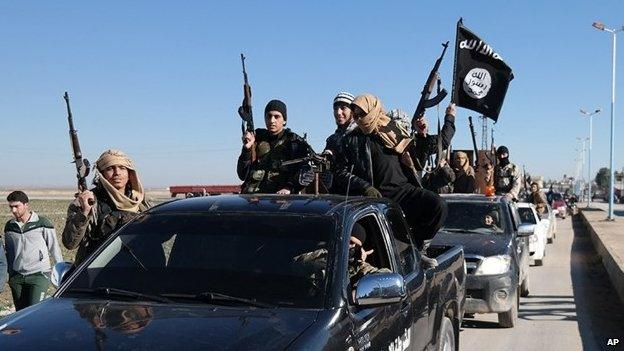
The ideology of Islamic State appeals to some Central Asians
The video of Tajikistan's former special service chief Gulmurod Khalimov announcing his "defection" to Islamic State (IS) has caused alarm in Central Asia, renewing debate over the threat the group might pose to the region.
Some worry that Central Asia might follow the radical path of countries such as Afghanistan, Iraq or Syria. The BBC's Abdujalil Abdurasulov in Almaty, Kazakhstan has this assessment.
Estimates vary, but it is thought that 1,500 to 4,000 Central Asians have joined different Islamist militant groups in Syria.
Many are recruited from the thousands who have travelled abroad for work - mostly those in Russia, who are particularly vulnerable to jihadist propaganda messages.
Discrimination, injustice and the harsh labour conditions many Central Asian migrants face create favourable ground for the recruiters.
Gulmurod Khalimov knew this only too well and directly addressed such migrant workers in his video statement.
"Working in Russia you became slaves of kafirs [non-believers]… You're churki [an offensive Russian word to describe Central Asians] for them, nothing more… Do jihad, come to the Islamic State. It's easier to get [here] from there."
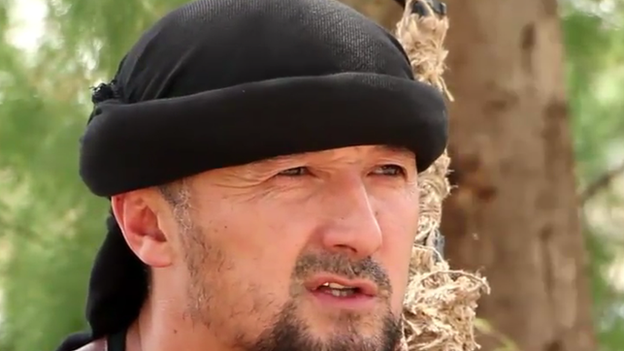
Gulmurod Khalimov urged others to join him in the ranks of IS
'Quite alien'
The world of social media, where such videos and messages are circulated, plays an important role in recruitment.
It has proved a useful networking tool for militants to communicate with potential converts.
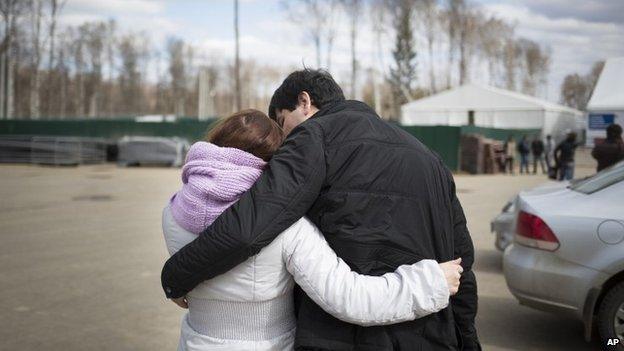
Central Asian migrant workers - especially those in Russia - are targeted by jihadist propaganda messages
Nevertheless, direct contact remains crucial, says Noah Tucker, managing editor of Registan.net.
"People from a village or a school who are recruited may also recruit people they know in real life," he says.
So why do people from Central Asia decide to travel thousands of kilometres to fight for a cause which is alien to the vast majority in this secular region?
Mr Tucker says that each individual case is different.
"But the overarching pattern that I see among Central Asians is that the young people who go want to belong to something bigger than themselves, often in a situation in which they feel isolated and alone," he said.
"They are looking for meaning in their lives, for something significant to be a part of."
According to official figures, about 300 Kazakh citizens have joined militants in Syria, about 350 from Kyrgyzstan and 380 from Tajikistan. They have joined a variety of militant groups in Syria, including those consisting of Uzbek militants.
While some Syria-based Central Asian jihadist groups have pledged their allegiance to al-Nusra Front, others have ended up with groups aligned to rival Islamic State.
'Righteous option'
International Crisis Group Central Asia Director Deirdre Tynan argues that the ideas of IS are seen as an attractive alternative to repressive regimes.
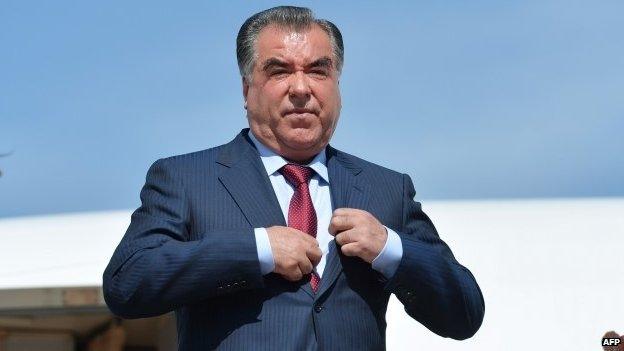
Tajik President Emomali Rakhmon has described IS as "the plague of the new century"
"The main reason why people are leaving I think is disaffection with what they see going on around [their] state," she said.
"There is no meaningful outlet for political or social ideas here in Central Asia and Islamic State presents a much more glamorous and righteous option."
However John Heathershaw of the University of Exeter argues, external that Gulmurod Khalimov took few, if any, comrades with him, and "it is not clear his defection reflects any pattern at all".
"We have no reason to expect that it will be replicated by similar figures. It certainly should not be understood as part of a widespread process of societal radicalisation.
"We know little about why individuals choose to join IS and should not read too much into their own rationalisations. Moreover, these individuals remain a very small minority."
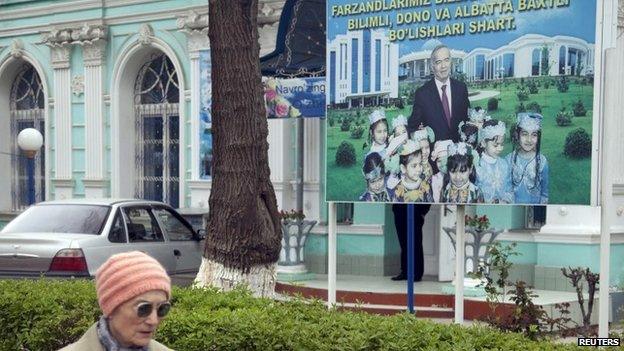
Central Asian politicians warn of the threat of instability posed by the militants
Other analysts also say that the threat is limited and argue that it is exaggerated by the region's governments to weaken their opposition.
In Tajikistan, Noah Tucker says, there has been a "concerted effort" to link IS in people's minds with the main opposition Islamic Renaissance Party.
Tajik President Emomali Rakhmon has described IS as "the plague of the new century [that] represents a threat for global security".
"These young people, when they return home, bring instability to society," he said.
And the rhetoric militants use only confirms such fears.
In one of the videos of Uzbek Islamist group Imam Bukhari Jamaat, the song played over the pictures of the military training sings that they "will take Shom [Syria]" and "will return to Uzbekistan". Militants in other videos say that they "will go to Uzbekistan, Kyrgyzstan, Tajikistan, everywhere".
Ominously Gulmurod Khalimov has also threatened to return to Tajikistan and bring "slaughter".

Which Central Asian groups are fighting in Syria?
The biggest Uzbek group in Syria is Imam Bukhari Jamaat, whose forces are concentrated in Aleppo
A smaller group, comprised mostly of ethnic Uzbeks, is called Tawhid wa-Jihad, operating in Idlib province
The Saifullah Jamaat group mostly comprises Dagestanis and Chechens and is led by an ethnic Uzbek known as Abu Ubaidah al-Madani
One of Central Asia's longest established militant groups, the Islamic Movement of Uzbekistan(IMU) - which claimed responsibility for an audacious assault last year on Karachi's international airport - has also pledged allegiance to IS but is not thought to be on the ground in Syria
